Top AI Companies in 2025 - Comprehensive Research
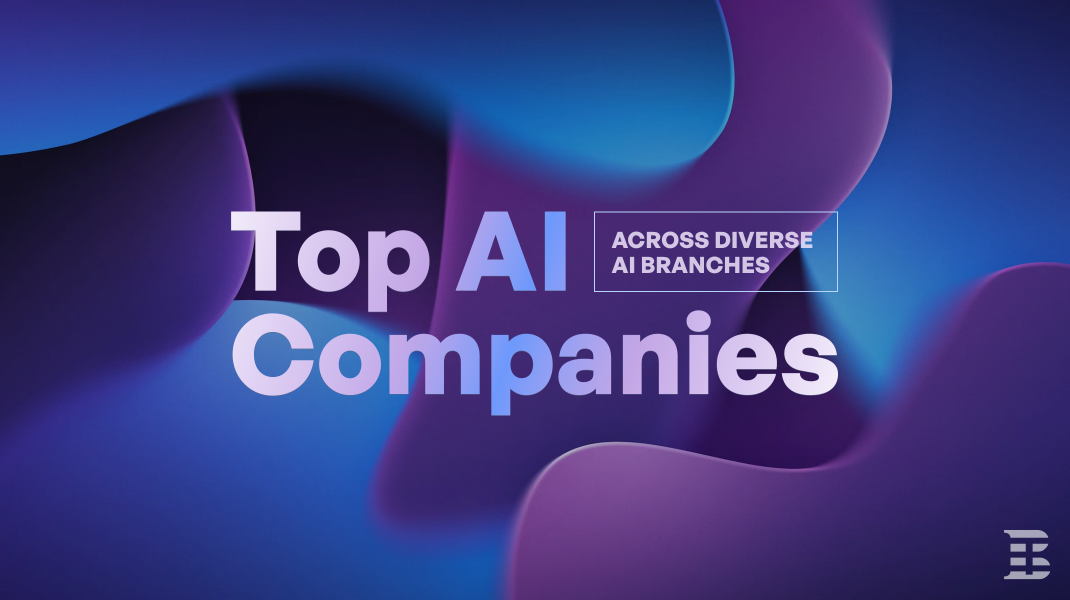
Artificial intelligence (AI) is no longer a notion from the future, it is present in every aspect of our modern lives and influences the way we live, work, and entertain. It’s obvious that AI has already revolutionized industries and redefined human-machine interactions.
However, what actually Artificial Intelligence is, and what its key branches are?
How do companies use the power of AI and who are the top players in this field?
Let us discover together the answers to all these questions, in our article below.
What is AI?
As we know intelligence is a defining characteristic of humanity. As humans we are gifted with intelligence, so we can see with our eyes and process what we see, we can understand our environment and can move within them. Our brains have the ability to see patterns, solve problems, and understand spoken language. All these are about the power and function of the mind.
The notion of artificial intelligence has its roots in antiquity, but much more pronounced interest in AI has grown in the first decades of the 21st century. AI is the capacity of computers to simulate actions that usually require human intelligence (such as learning, problem-solving, language understanding, etc). To do this computers need a lot of data to allow algorithms to identify patterns, make predictions, and recommend actions like a human can.
Artificial intelligence is all around us.
Exploring the Diverse Branches of AI
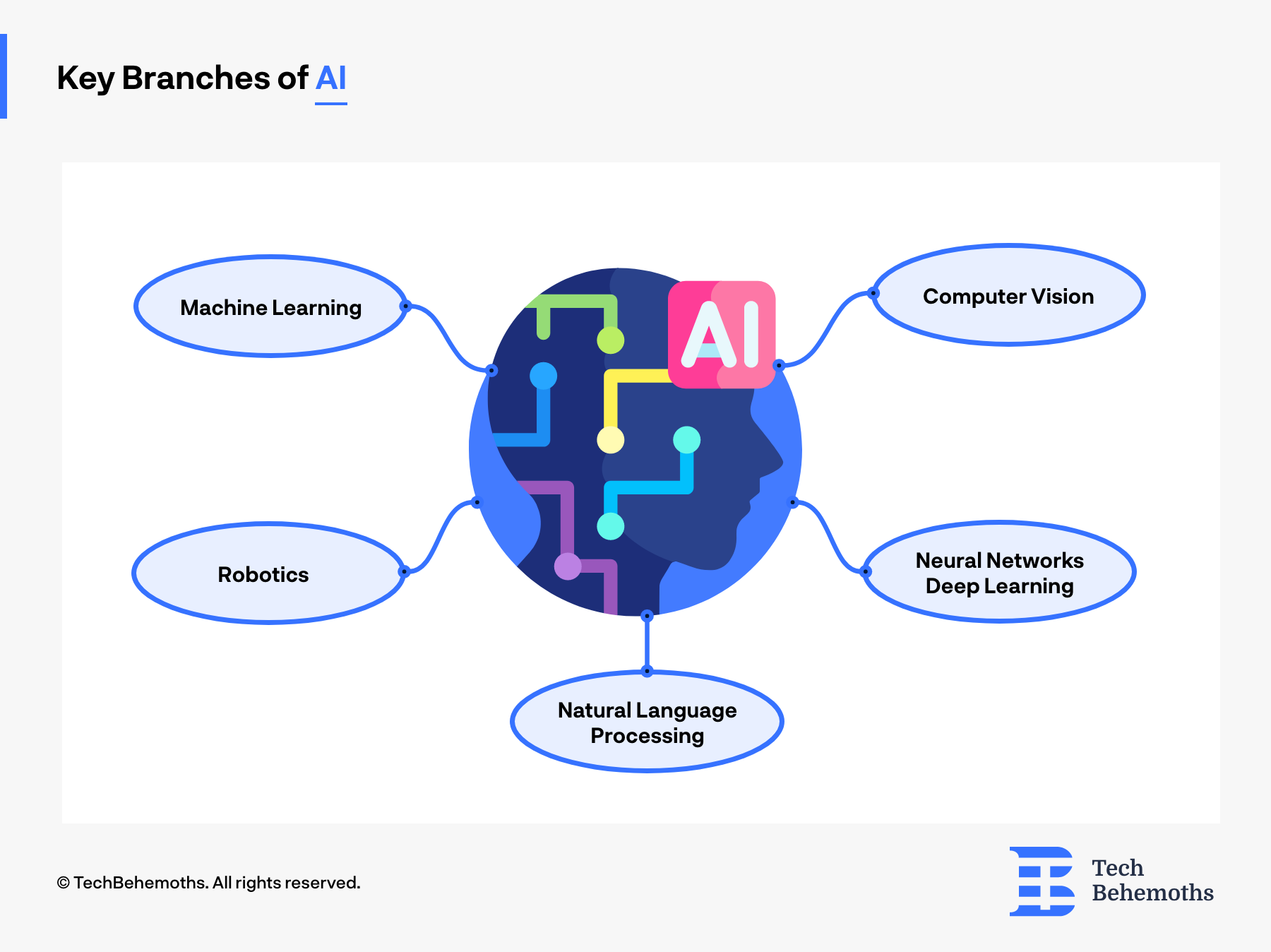
There are many branches of AI, each with a focus and set of techniques. Some of the key branches of AI include:
-
Machine learning (ML)
Machine learning (ML) is a type of AI that allows machines to learn without being explicitly programmed. It is done by filling the computer with large amounts of data like numbers, photos, or text and allowing it to identify patterns in these data, learn them, and use them later to explain, make predictions, or suggestions about what decision to take. Machine learning is part of many AI applications, from recommendation systems, image recognition, spam filtering, and natural language processing to fraud detection.
-
Natural language processing (NLP)
Natural language processing (NLP) is a branch of artificial intelligence that makes it possible for computers to understand and process human language by breaking it down into its component parts, such as words, phrases, and sentences. Once the computer has understood the language, it can use it to perform tasks such as translation, text summarization, and question answering. NLP is the center of language translation applications, correction software, voice assistants, and more.
-
Neural Networks Deep Learning
Neural networks is a sophisticated technique that is capable of learning hierarchical representations of data, determined by the importance of all given variables.
The Neural Network's name and structure for this type of AI is inspired by the human brain, simulating the way that biological neurons signal to each other. Machines the same utilize neural networks with multiple layers to analyze and process data. This approach has remarkable results in tasks like image recognition, speech synthesis, and natural language understanding.
-
Computer Vision
Computer vision is a type of AI that lets computers see and understand the world around them. This is done by feeding the machine with images and allowing it to identify objects, patterns, and scenes in the images. Once the machine has understood the images, it can use them to perform different tasks such as object detection and scene understanding in a wide range of applications, like facial recognition, self-driving cars, or medical image analysis.
-
Robotics
Robotics combines AI with engineering to create smart machines that can interact with the physical world and perform different tasks. These robots can do different jobs in industries, like making things in factories, helping doctors in hospitals, and even driving cars. They learn from their actions, getting better at what they do. So, they become more helpful and efficient over time, making human lives easier by taking on tasks that might be even dangerous.
Leading AI Companies
The emergence of artificial intelligence (AI) has had a significant impact on business, with many of today's top companies utilizing this technology to offer innovative products and services. Currently, there are over 58.000 AI companies operating worldwide, all of which are dedicated to harnessing the power of AI to take their offerings to the next level. Forwards, let’s take a look at which are the leading IT companies in each branch of AI highlighting why they are among the top performers.
Best ML Companies
Amazon Web Services (AWS)
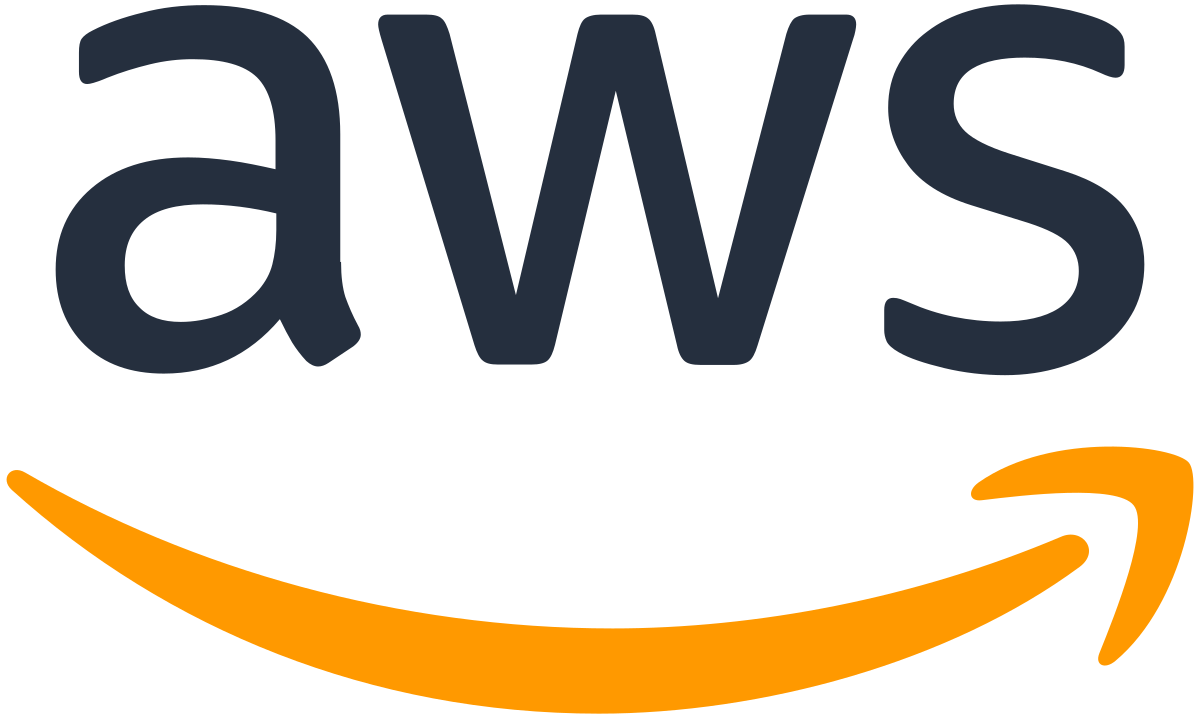
AWS or Amazon Web Services, is the cloud-computing service division provided by Amazon that was launched in March 2006. Among its many other services within cloud computing, AWS provides machine-learning and AI-based services, mainly for medium to large companies and at the enterprise level. This is why, we can call AWSia a leading machine learning service provider that powers a variety of ML services.
The company has over 100,000 employees, and it is headquartered in Seattle, Washington.
As of 2023, AWS has over 1.5 million active customers and generates an annual revenue of more than $85 billion, which is a 16% increase from the previous year.
In 2012, Amazon Web Services (AWS) introduced its first artificial intelligence (AI) product called Amazon Lex, which offered conversational AI capabilities. Since then, AWS has successfully launched several other AI products and a number of successful ML-powered products, including:
Its latest Machine Learning product - Amazon SageMaker is designed to serve three purposes:
- Business Analytics through Canvas and BI autopilot
- Data Science exploration through SageMaker Studio Lab and JumpStart
- Machine Learning Engineering with accelerated model development.
It is also known that AWS SageMaker supports frameworks and tools such as PyTorch, Tensor Flow, Jupyter, and Hugging Face among others.
All the above-mentioned ML services provided by AWS are easy to use and integrate into applications Or at least that’s how they market their products.
Microsoft
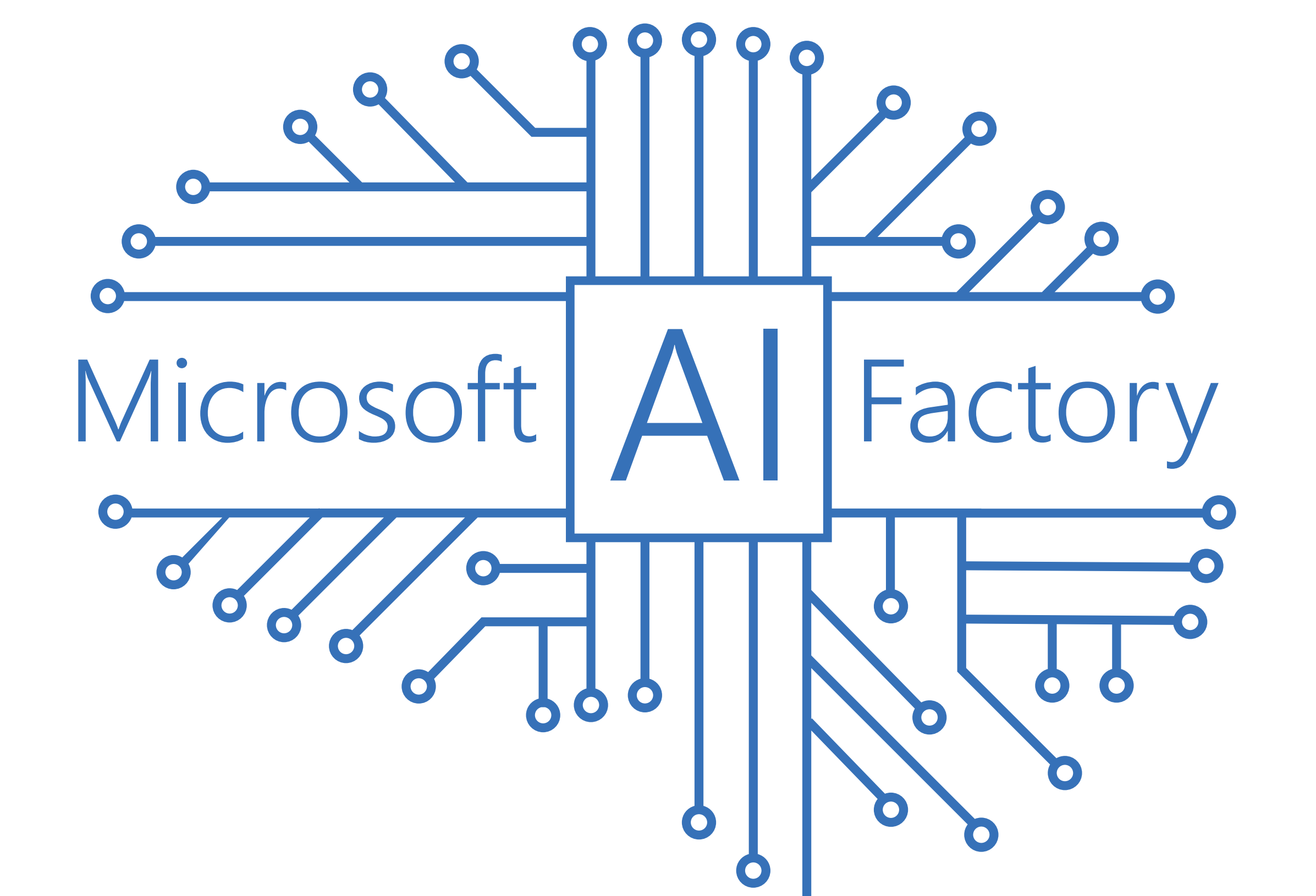
Microsoft is a notable company in the arena of artificial intelligence (AI) and machine learning. The company has over 180,000 employees, and its AI-related revenue is estimated to be over $10 billion. It is headquartered in Redmond, Washington, United States.
Microsoft released its first AI product in 2001, and since then, it has become a significant presence in the AI industry.
Top Microsoft's machine learning project is Azure Machine Learning, a platform that operates on the cloud and is used to create and release machine learning models. It provides customers with AI-driven features and solutions to enhance their productivity and efficiency.
Another recently-launched AI product by Microsoft is the Microsoft Designer. It is very likely to be Midjourney or other generative AI models, but it comes with a big plus - It actually generates text-accurate images, with no limits or being distorted like other competing products on the market.
To try the Microsoft designer all you need is to log in with a Microsoft account.
Here’s a prompt example:

Microsoft is making significant progress in leveraging AI to make a real impact on the world.
Dataiku
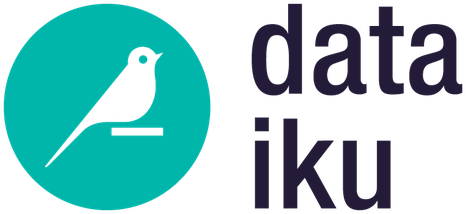
Dataiku is a top AI and machine-learning company, founded in Paris by Lorian Douetteau, Clément Stenac, Thomas Cabrol, and Marc Batty, in 2013, with headquarters in New York.
The company has over 1,000 employees and has raised more than $150 million in annual revenue, which means a 60% year-over-year ARR growth.
Dataiku is a user-friendly platform, that runs several large machine-learning projects such as:
-
Dataiku AutoML is a tool that is adapted to automate the machine-learning process in order to be possible for non-technical users to build and deploy AI models.
- Dataiku Data Science Studio provides a collaborative space for data scientists to work together on machine learning projects.
In the next years, the company is expected to grow considering the high demand for AI and machine learning solutions.
Best NLP companies

Google is one of the top NLP development companies, as their studies and AI projects have a long history. Their first AI product launched in 2001 was called the Google Neural Network Language. Later, the giant from Mountain View runs several other NLP projects:
- Bard
- Google Assistant
- Google Translate
- Bert
- Vertext AI
- Cloud Natual Language
- Contact Center AI
- AI Readiness Program
All these three projects were developed between 2006 - 2023 But there the list of AI products developed by Google is far from limited to this one. You can consult the full list on their cloud ai dedicated page
Google has over 160,000 employees worldwide, and its revenue in 2022 was $257.6 billion.
Their products are used by millions of people around the world, as well as Google's NLP research published in hundreds of papers in top academic conferences and journals, having a great impact on the field.
One thing we can state on this topic is that some AI products developed by Google still need to be finetuned to reach their maximum potential.
Baidu

Baidu is a leading Chinese AI company and one of the largest technology companies in the world. It was founded 23 years ago, in January 2000, and is headquartered in Beijing, China.
Their first AI product was launched in 2010, called Baidu Speech.
One of the main company's focuses is NLP, being a pioneer in this field. Today, Baidu NLP products and services are used by millions of people worldwide. Among them are the following:
-
Ernie Bot, which has been developed since 2019, but was introduced recently in March 2023.
-
DuerOs, a voice assistant that understands and responds to natural language commands.
-
Baidu Brain is a platform that provides access to NLP technologies.
-
Baidu Translate translates text from over 100 languages.
-
Baidu Speech can convert speech to text.
The company has over 40,000 employees, and its revenue for the first quarter of 2023 was $4.54 billion, increasing 10% year over year.
Baidu is constantly developing, and as a result of its efforts, Baidu is well-positioned to continue to be a leader in the field of NLP.
OpenAI

OpenAI is an American AI company, founded in December 2017 by Elon Musk, Sam Altman, Ilya Sutskever, and others, headquartered in San Francisco, California.
OpenAI is renowned for its development of GPT (Generative Pre-trained Transformer) models. They launched their first AI product, GPT-1, in 2018. Later they developed a number of NLP products, NLP being one of the main areas of their activity. Some of the most notable NLP projects are:
-
Chat GPT: GPT3 and GPT4, launched in November 2022, but stable released in May 2023
-
OpenAI Codex is used to generate code, translate languages, and answer questions about code.
-
Whisper is a speech recognition model.
OpenAI has 375 employees and an annual revenue of over US$28 million for 2022 but was projecting $200 million in revenue in 2023 and $1 billion in revenue in 2024.
IBM Watson

IBM Watson is a leading AI platform, located in Yorktown Heights and Albany, New York as well as Cambridge, Massachusetts. The company has a long history of innovation and is a front provider of natural language processing (NLP) technology.
Their very first IBM Watson AI product was launched in 2011, called Watson an advanced question-answering system developed to answer questions on the quiz show Jeopardy. Competing at that time against champions Brad Rutter and Ken Jenning and winning the first place prize of 1 million USD.
Later other NLP products were developed, among which are:
IBM Watson has over 10.000 employees, in 2023 their market size is valued at $5.50 billion and it is expected to reach over $75 billion by 2033.
The company constantly invests in NLP research and development and its products are used by some of the world’s largest companies such as Bank of America, which uses IBM Watson to improve customer service, and Coca-Cola to analyze social media data.
Best Deep Neural Networks Companies
Intel
Intel is a technology company headquartered in California. It was founded in 1968 and in the early years the company was focused on developing memory chips, however, it started to expand into other fields, and today is one of the leading deep neural networks companies.
Intel's first AI product was launched in 2012. The product was called the Intel® Movidius™ Myriad™ 2 Vision Processing Unit (VPU), and it was designed for use in mobile devices.
Now, Intel offers a vast choice of products and services for DNN development. Here are some of them:
Intel has over 100,000 employees and a revenue of over $77 billion.
The company is an expert in the DNN field, having a wide portfolio of products, which gives the consumer the right to choose the most suitable product for him, and at the same time, Intel maintains a strong partnership with other companies like cloud providers, software vendors, and hardware manufacturers to help customers to deploy efficiently DNNs on a large scale.
Qualcomm

Qualcomm is a top technology company from San Diego, California, established in 1985 and for now a leading DNN company. It has a strong track record of innovation in the DNN space and is one of the first companies to develop a dedicated DNN processor, launched in 2016, being the first Qualcomm’s AI product, called the Snapdragon 820 processor.
Other Qualcomm's top DNN projects and products include:
Qualcomm has over 40,000 employees worldwide. The company's revenue in 2022 was over $40.2 billion. Its solutions are designed to be fast and efficient, positioning the company as a leader in the development and deployment of DNN-powered applications.
Google and Microsoft
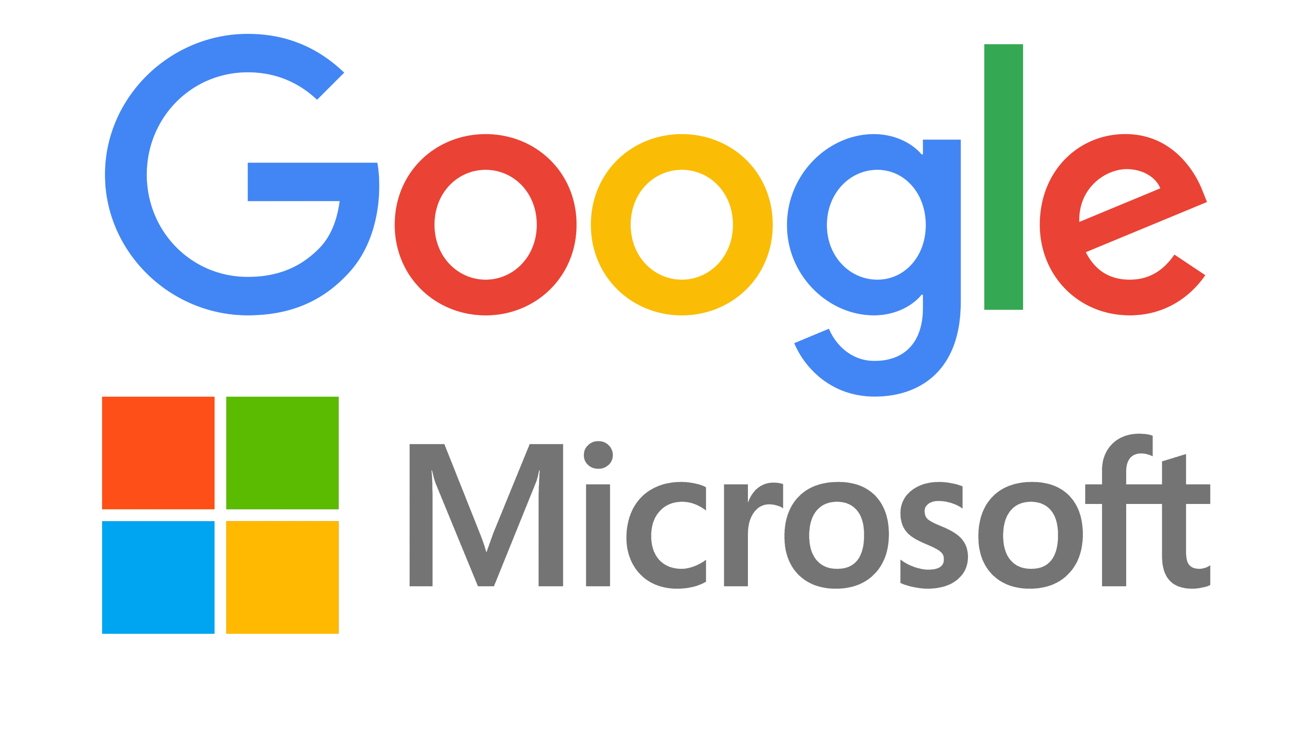
As mentioned earlier, Google and Microsoft are two leading companies in the field of artificial intelligence. As shown by the projects they also have in the field of deep neural networks (DNN) as well.
Let's take a closer look at what these projects are.
-
Google’s search algorithm - one of the most well-known neural networks
-
DeepMind pioneered the use of deep learning to solve complex problems, used in a variety of Google products, including Google Maps, Android, and Google Cloud.
-
AlphaGo is a deep-learning program that defeated a professional Go player in 2016.
Microsoft
-
Cognitive Services: is a suite of application programming interfaces that provide access to Microsoft's deep learning models and can be used to build a variety of applications, such as image recognition, speech recognition, and natural language processing.
-
Bing is Microsoft's search engine. It uses deep learning to perform a number of functions, such as image search, voice search, and personalized recommendations.
Now we will go further to explore the best Computer Vision and Robotics companies.
Best Computer Vision Companies
SenseTime

SenseTime is a leading computer vision company headquartered in Hong Kong. It was founded in 2014 by Tang Xiao'ou, a professor at the Chinese University of Hong Kong, and computer scientist Xu Li, among others.
The company's first AI product was released the same year it was founded, a facial recognition technology - DeepID. It is one of the most accurate facial recognition technologies in the world.
Other top SensTime computer vision projects and products are:
-
SenseME - an emotion recognition technology
-
SenseFoundry - a software platform for developing and deploying computer vision applications
The company has over 6,000 employees and its revenue is over $3 billion.
SenseTime has a strong team of technical experts with deep experience in computer vision that constantly develop new computer vision products.
Apple

Apple is a company located in Cupertino, California, in the heart of Silicon Valley. It is among the top five largest information technology companies in the United States, along with Amazon, Google, Microsoft, and Facebook. Its first AI product was launched in 2011, Siri - a voice assistant.
It is important to mention that Apple is also a top computer vision company because it has a number of innovations in this area. Here are some of its most notable computer vision projects:
-
Face ID is used for facial recognition in the iPhone in order to unlock the device and authorize payments.
-
Animoji are animated emojis, compatible with iPhone or iPad Pro that allow you to create an animated Memoji that uses your voice and your facial expressions.
-
Live Text allows extracting text from images and videos that appear within the camera frame.
-
Object detection identifies objects in images.
-
Scene understanding is used in the Maps app to understand the surroundings and provide directions.
Apple's total number of employees in 2022 was 164,000 and its revenue is estimated to be $94.84B.
Tesla

Tesla is an American automotive company, headquartered in Austin, Texas.
This company is also known for its advanced self-driving technology, which relies heavily on computer vision algorithms, making it rightfully a top computer vision company in the automotive industry.
Its first AI product was launched in 2015 and it was an Autopilot software. Other of Tesla's top computer vision projects/products are:
It is important to mention that Tesla's computer vision team is one of the largest and most experienced in the world, with over 120,000 employees, the company has a revenue $24.8 billion for the quarter ending June 30, 2023.
Tesla's computer vision capabilities are constantly improving Its computer vision algorithms are some of the most advanced in the world.
Best Robotics Companies
KUKA

KUKA is a German manufacturer of industrial robots and systems for factory automation, founded in 1898, and it has been a pioneer in the development of new robot technologies ever since.
First AI product the company launched in 2017. IT was KUKA AI Assistant - a software solution to help robots to adapt to their environment.
Other of KUKA's top projects and products in the field of Robotics are:
-
The LBR iiwa, a lightweight, flexible robot
-
KR Quantec is a performance robot used in automotive production and more
-
The KUKA SmartProduction Suite is a suite of software tools that helps customers to manage their automation projects.
The company has won numerous awards for its innovation and technology and employs around 14,000 people worldwide. The company had revenue in 2022 of around 4 billion euros.
FANUC

FANUC is a Japanese group of companies, founded in 1972, headquartered in Oshino, Yamanashi, Japan. It is the largest supplier of industrial robots in the world.
Their first AI product was FANUC iRVision a vision system that uses AI to help robots identify and pick objects. Some of FANUC's top robotics projects and products also include:
FANUC has over more than 8000 employees and a revenue of $6.2 billion.
The company's robots are used in over 200 countries and regions in a wide variety of industries, including automotive, electronics, and food and beverage.
Boston Dynamics

Boston Dynamics is an American robotics, engineering, and design company, founded in 1992. Since then, the company distinguished itself by developing a number of impressive robots, such as:
-
BigDog was designed for military applications
-
Spot was designed for commercial applications
-
Atlas was designed to search and rescue applications. Atlas is capable of walking, running, and climbing.
-
Handle was designed for warehouse and logistics applications, and is capable of picking and placing objects
Their first AI product was the SpotMini robot, launched in 2016. SpotMini is a smaller, more agile version of Spot that is designed for indoor applications.
The company currently has around 500 employees, and its revenue is not publicly disclosed.
Boston Dynamics is considered to be one of the top robotics companies in the world as its robots are known for their agility, strength, and intelligence.
Conclusion
With all of this information, we can say that Artificial Intelligence (AI) is like a brain for machines.
AI is a big part of how technology works today and it influences how we use machines, and how businesses and industries work.
AI companies in different areas are contributing to global technology development by innovating new products for large and niche consumers. Their projects have proved to be useful for professionals in different fields, but at the same time threaten the existence of human professionals in certain areas.
As AI keeps developing, the list of specialized companies in this field will grow, and so will the number of AI projects they launch. However, it’s still uncertain how will AI gain mass adoption in the near future, considering the global concerns over its impact on processes and human capital.
